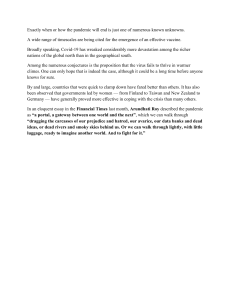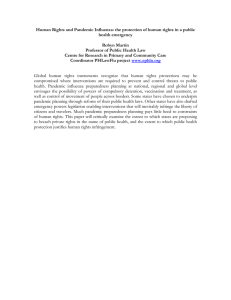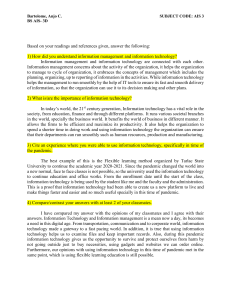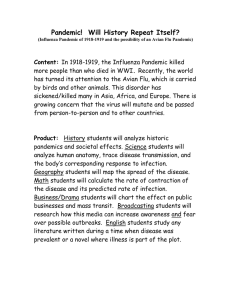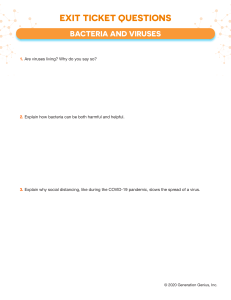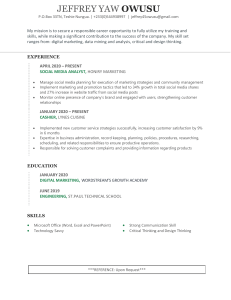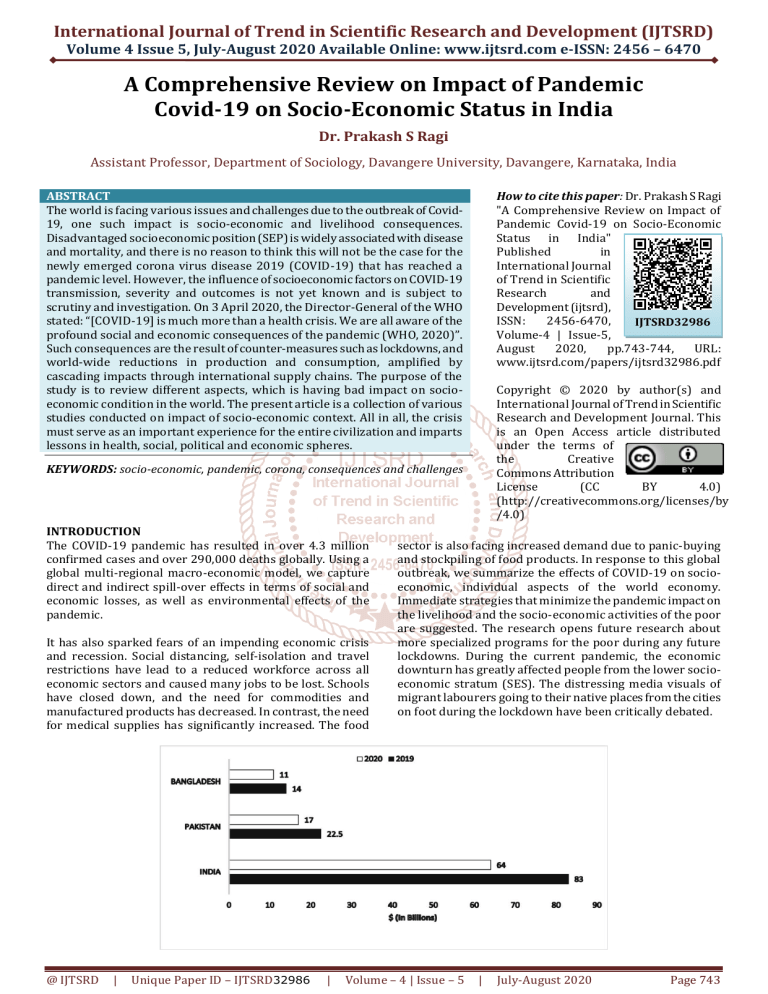
International Journal of Trend in Scientific Research and Development (IJTSRD)
Volume 4 Issue 5, July-August 2020 Available Online: www.ijtsrd.com e-ISSN: 2456 – 6470
A Comprehensive Review on Impact of Pandemic
Covid-19 on Socio-Economic Status in India
Dr. Prakash S Ragi
Assistant Professor, Department of Sociology, Davangere University, Davangere, Karnataka, India
ABSTRACT
The world is facing various issues and challenges due to the outbreak of Covid19, one such impact is socio-economic and livelihood consequences.
Disadvantaged socioeconomic position (SEP) is widely associated with disease
and mortality, and there is no reason to think this will not be the case for the
newly emerged corona virus disease 2019 (COVID-19) that has reached a
pandemic level. However, the influence of socioeconomic factors on COVID-19
transmission, severity and outcomes is not yet known and is subject to
scrutiny and investigation. On 3 April 2020, the Director-General of the WHO
stated: “[COVID-19] is much more than a health crisis. We are all aware of the
profound social and economic consequences of the pandemic (WHO, 2020)”.
Such consequences are the result of counter-measures such as lockdowns, and
world-wide reductions in production and consumption, amplified by
cascading impacts through international supply chains. The purpose of the
study is to review different aspects, which is having bad impact on socioeconomic condition in the world. The present article is a collection of various
studies conducted on impact of socio-economic context. All in all, the crisis
must serve as an important experience for the entire civilization and imparts
lessons in health, social, political and economic spheres.
How to cite this paper: Dr. Prakash S Ragi
"A Comprehensive Review on Impact of
Pandemic Covid-19 on Socio-Economic
Status in India"
Published
in
International Journal
of Trend in Scientific
Research
and
Development (ijtsrd),
ISSN:
2456-6470,
IJTSRD32986
Volume-4 | Issue-5,
August
2020,
pp.743-744,
URL:
www.ijtsrd.com/papers/ijtsrd32986.pdf
Copyright © 2020 by author(s) and
International Journal of Trend in Scientific
Research and Development Journal. This
is an Open Access article distributed
under the terms of
the
Creative
Commons Attribution
License
(CC
BY
4.0)
(http://creativecommons.org/licenses/by
/4.0)
KEYWORDS: socio-economic, pandemic, corona, consequences and challenges
INTRODUCTION
The COVID-19 pandemic has resulted in over 4.3 million
confirmed cases and over 290,000 deaths globally. Using a
global multi-regional macro-economic model, we capture
direct and indirect spill-over effects in terms of social and
economic losses, as well as environmental effects of the
pandemic.
It has also sparked fears of an impending economic crisis
and recession. Social distancing, self-isolation and travel
restrictions have lead to a reduced workforce across all
economic sectors and caused many jobs to be lost. Schools
have closed down, and the need for commodities and
manufactured products has decreased. In contrast, the need
for medical supplies has significantly increased. The food
@ IJTSRD
|
Unique Paper ID – IJTSRD32986
|
sector is also facing increased demand due to panic-buying
and stockpiling of food products. In response to this global
outbreak, we summarize the effects of COVID-19 on socioeconomic, individual aspects of the world economy.
Immediate strategies that minimize the pandemic impact on
the livelihood and the socio-economic activities of the poor
are suggested. The research opens future research about
more specialized programs for the poor during any future
lockdowns. During the current pandemic, the economic
downturn has greatly affected people from the lower socioeconomic stratum (SES). The distressing media visuals of
migrant labourers going to their native places from the cities
on foot during the lockdown have been critically debated.
Volume – 4 | Issue – 5
|
July-August 2020
Page 743
International Journal of Trend in Scientific Research and Development (IJTSRD) @ www.ijtsrd.com eISSN: 2456-6470
Objectives of the study:
1. To analyze the socio-economic impact to determine the
pandemic causing various problems.
2. To integrate literature review to highlight the
consequences of the global pandemic to be
impoverished.
3. To suggest immediate strategies to minimize the impact
on the livelihood and socio-economic activities.
Discussion of the study:
1. Hema S Gopalan (Sep-October 2020) studied the
pandemic challenges for socio-economic issues,
healthcare and national health programs in India. While
the nationwide lockdown has resulted in financial losses
and has affected all segments of society, the domino
effect on health, healthcare and nutrition could possibly
pose major setbacks to previously gained successes of
National health programs. Apart from firm economic
measures, all National Health Programs should be restrengthened to avert possible surge of communicable
(apart from COVID19) and non-communicable diseases.
These efforts should be focussed on population
belonging to low SES.
2. Sandeep Kumar M et.al. (July 2020) The situations of
COVID-19 will certainly have an adverse effect over and
above health care on factors of the internet of things
(IoT) market. To overcome all the above issues, IoT
devices and sensors can be used to track and monitor
the movement of the people, so that necessary actions
can be taken to prevent the spread of coronavirus
disease (COVID-19). Mobile devices can be used for
contact tracing of the affected person by analyzing the
geomap of the travel history. This will prevent the
spread and reset the economy to the normal condition.
3. Manfred Lenzen et.al. (July 2020) conducted a study on
global socio-economic losses and environmental gains
from the corona virus pandemic. The study highlights
various factors impacting on the pandemic. Our
approach uses constrained non-linear optimization to
determine the maximum level of global consumption
that is possible under given (exogenous) reductions of
economic output by taking into account the effects of
industry shutdowns, lockdowns and travel restrictions.
The difference between this maximum level and the preCOVID-19 world economy are consumption losses. In
turn, these consumption losses set in motion supplychain effects that ripple across the world economy, and
lead to global losses of income, employment, and
reductions of emissions.
4. M. Nicola et.al. (June 2020) studied the socio-economic
implications of the corona virus pandemic. The study
target to reduce the workforce across all economic
sectors and caused many jobs to be lost caused by
@ IJTSRD
|
Unique Paper ID – IJTSRD32986
|
social-distancing, self-isolation and travel restrictions.
Schools have closed down, and the need for
commodities and manufactured products has decreased.
In contrast, the need for medical supplies has
significantly increased. The food sector is also facing
increased demand due to panic-buying and stockpiling
of food products. In response to this global outbreak,
summarized the socio-economic effects of COVID-19 on
individual aspects of the world economy. It is prudent
that governments and financial institutions constantly
re-assess and re-evaluate the state of play and ensure
that the ‘whatever it takes’ promise is truly delivered.
5. Kanupriya (May 2020) studied the perspective of a
socio-economic condition through covid-19. his
perspective could be seen in the context of the ongoing
debates on the nature and consequences of the crisis, as
also the evolving dynamics of the same. The article
examines the current situation and also factors in any
future changes. A number of solutions have been offered
for an effective tackling of this deadly disease, keeping in
mind the global developments.
6. Chandra Sekhar (May 2020) identified the impact of
covid-19 on policy interventions and socio-economic in
Andhra Pradesh. The COVID-19 pandemic has claimed
several lives and has already adversely affected the
livelihoods of millions of vulnerable households. This
policy brief surveys the current status of the disease, its
spread and its likely socio-economic effects in the
context of Andhra Pradesh, India. Given the global scope
of the shock, the policy brief emphasizes the need for
innovative and bold policy measures, particularly from
the states’ perspective. Yet, in a state like Andhra
Pradesh where a vast majority of the work force
depends on informal sector, such a freeze is likely to
have devastating effects on the livelihoods of millions of
households.
References:
[1] Lenzen M, Li M, Malik A, Pomponi F, Sun Y-Y,
Wiedmann T, et al. (2020) Global socio-economic
losses and environmental gains from the Coronavirus
pandemic.
PLoS
ONE
15(7):
e0235654.
https://doi.org/10.1371/journal.pone.0235654
[2] https://doi.org/10.1016/j.ijsu.2020.04.018
[3] https://doi.org/10.1016/j.dsx.2020.05.041
[4] https://doi.org/10.1177%2F2319714520923918
[5] Ramakumar, Ram (2020). The Covid--19 Pandemic and
Indian Agriculture: A Note. Foundation for Agrarian
Studies, available at: http://fas.org.in/blog/covid19[6]
https://doi.org/10.1108/IJPCC-06-2020-0053
Volume – 4 | Issue – 5
|
July-August 2020
Page 744

